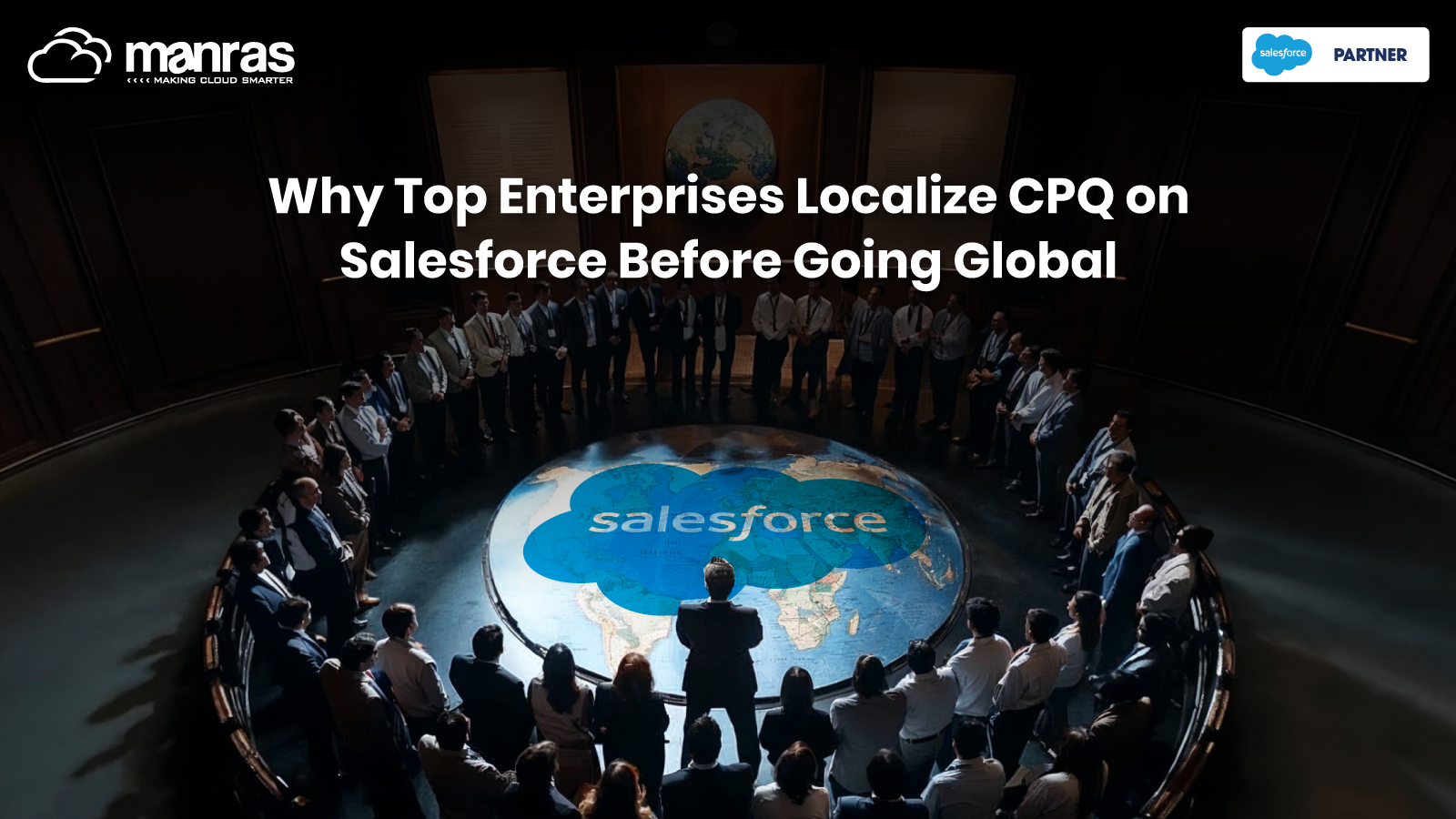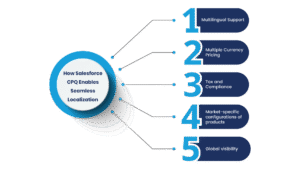
Why Top Enterprises Localize CPQ on Salesforce Before Going Global
The global market is seamless in concept, but Salesforce CPQ localization makes that a reality by catering to the nuances of each market. Buyers want proposals in familiar languages, pricing in their native currency, and terms that match local laws.
Failure to provide this experience undermines credibility and lengthens sales cycles. Leading enterprises evolve their quoting process based on local markets to build trust before a global exercise.
Salesforce CPQ allows enterprises to do this. It takes a single sales engine and creates the flexibility required to develop a system that is effective across numerous local markets.
A localization strategy is also important for leaders to eliminate barriers to entry, optimize time-to-quote, and establish a framework for sustainable, global growth. Global expansion starts not only with huge investments but also with local precision.
The Basics of Salesforce CPQ Localization
Enterprises pursue global opportunities, but Salesforce CPQ localization focuses its strategy on local markets. Localization involves more than translation; it changes the interaction with how sales teams configure products, price offers, and deliver quotes in a way that feels effortless to navigate for the buyer.
1. Language Contextualization
Sales teams communicate directly with customers when they provide quotes in the customer’s own language. Reps deliver offers in whichever language best suits the customer. Direct messaging equates with quicker decisions.
2. Pricing Consistency
Customers expect to see pricing quotes with currency represented in their currencies. Salesforce CPQ permits organizations to provide mapped currency through the creation of multiple currencies and dynamic exchange rates with real-time functioning. This consistency means more accurate quotes (fewer errors), less friction during negotiation with sales teams, and maximization of customer experience and service.
3. Tax and Compliance Accuracy
Every market is subject to different tax rules and regulatory frameworks. With CPQ localization, organizations have the ability to leverage the correct region’s technology-based tax code, remain compliant, and mitigate legal risks. They eliminate delay by automating region-based requirements (tax, discount, compliance) in their quote creation process.
4. Market-based Configurations
Organizations know that product configurations differ from region to region. Salesforce CPQ allows sales teams to configure bundles, features, and pricing models in ways that reflect the actual market. Organizations avoid over-segmented, underpriced, or irrelevant options.
5. Global Standards with Local Flexibility
While each region will need localized initiatives, organizations will also have a single point of sales engine. CPQ localization helps organizations enforce a unified framework globally while still giving markets the agility they need, ensuring leaders see everything without blocking sales momentum.
Why Enterprises Localize CPQ Before Expansion
Global enterprises seek growth, but Salesforce CPQ finds frictionless growth. Customers trust brands they can engage in their local language, display prices in familiar currencies, and follow some form of regional regulatory compliance.
Sales leaders drive consistency when each proposal aligns with regional expectations and market conditions.
Enterprises localize to reduce deal cycles. When working in local currencies, the risk of conversion errors is eliminated. The use of localized tax rules ensures compliance-related delays are avoided.
Precise product configurations mitigate the likelihood of overselling or underdelivering. In this environment, every localized quote earns credibility and builds a relationship with the buyer.
Expansion beyond domestic markets is not only ambition. It is about precision. Enterprises that localize CPQ before scaling will build trust more quickly and accelerate their expansion asset more effectively. They lay the groundwork necessary for sustainable revenue growth across borders.
The Risks of Ignoring Localization
There is nothing easier (and more profitable) than selling in new domestic markets, even at the enterprise level. Salesforce CPQ localization navigates the line between seamless expansion and costly mistakes.
Teams that ignore localization can have quotes created in the wrong language, inaccurate pricing in the wrong currency, and a fundamental misunderstanding of tax rules. When customers sense that they are being sold to from foreign proposals, they lose trust immediately.
Sales cycles become longer when sales reps struggle to navigate compliance requirements that differ from region to region. Time is wasted by finance teams fixing inaccurate tax codes and currency exchange rates before deals can close.
Leadership remains obscured in disparate models, where localized data getting lost means missed opportunities and revenue, and development brands become damaged.
Disregard for localization is a block to growth. When enterprises are not open to localization, they will experience resistance from customers, penalties from regulators, and nationwide delays to closing deals.
Competitors that embrace Salesforce CPQ and use localization in their proposals are giving themselves a competitive advantage, working on the buyer’s terms, and keeping their teeth in operational efficiency.

How Salesforce CPQ Enables Seamless Localization
Going into new regions is increasingly easy, but Salesforce CPQ localization means the expansion can remain seamless by localizing each quote to their needs while maintaining the global consistency.
A sales team that can personalize the experience helps develop and lead the trust of a customer, while an enterprise can maintain standardization for pricing, compliance, and reporting. The shared balance will accelerate sales and increase trust with customers.
1. Multilingual Support
Reps deliver offers in whichever language best suits the customer. Clear dialogue eliminates doubt and builds confidence with buyers.
2. Multiple Currency Pricing
Enterprises can configure the appropriate real-time exchange rates and show the price in local currencies. The correct home pricing means time savings and fewer errors in currency conversion and correct pricing. One less step in the process helps develop trust more quickly.
3. Tax and Compliance
Finance teams apply their specific tax codes and regulations in the regions they are quoting for within the Salesforce quoting. Leveraging automation for compliance minimizes the risk of non-compliance while speeding up lengthy processes.
4. Market-specific configurations of products
Sales teams update bundles, discounts, and features to match the needs of each market. A large, international organization should demonstrate this kind of flexibility to remain relevant! It’s essential to localize to avoid overselling or underdelivering for a large-scale organization.
5. Global visibility
Leadership can view all areas of all regions in one environment via Salesforce CPQ. Strategy execution has resiliency and local flexibility while maintaining global control.
Best Practices for Global Expansion Planning
Enterprises capture their global strategies easily, but it is the other factors ensuring that the localization of Salesforce CPQ translates those global plans into profitable real-world execution across markets.
Leaders who regard localization as a core component of a growth engine create trust with customers to mitigate risk, accelerate deal cycles, and avert mistakes that impair relationships. The right type of focus will create a competitive advantage from a localization program!
1. Localize early on
Enterprises bake localization into their CPQ strategy up front.If they think for a moment, they save expensive rework as they gauge preparation for product rollouts to new regions.
2. Leverage local experts
Sales leaders work directly with teams in the local market who understand, in detail, cultural differences, pricing expectations, and compliance requirements in their region. This subject matter expertise ultimately strengthens every quote.
3. Automate compliance updates
Teams logically program Salesforce CPQ to track and efficiently apply local sales tax and developments in regional legal compliance automatically, which also helps keep the sales cycle expeditious, fast, and with very little error!
4. Test your localized workflows.
Enterprises run locally focused pilot programs in their localized target area before a channel roll-out date. Running a test is an excellent way of identifying gaps and refining processes without committing to a large market disruption.
5. Balance Global Consistency as Well as Local Flexibility
Leadership has one global CPQ framework while allowing local teams flexibility for adjustments. This balance accomplishes efficiency and authenticity.
Enterprise Best Practices for Global Expansion
Enterprises have the global strategies, but Salesforce CPQ makes sure the strategies translate into action and success in actual markets. Leaders who view localization as a driver for growth build trust with customers, shorten deal cycles, and avoid costly delays. Practice the appropriate processes to convert localization from a cost into a competitive advantage.
1. Start Localization Early
Enterprises employ localization strategy and practices as a part of the CPQ strategy from the beginning. Early work mitigates rework and makes the rollout easier in new regions.
2. Engage local market expertise.
Sales leaders partner with the local market team, who are experts, to not only recognize cultural differences but also buy influences, local pricing expectations, and compliance factors. An unforeseen value is these local market team experts add confidence to every quote.
3. Automate Compliance Changes
Teams configure Salesforce CPQ and enable the systems to keep track of regional tax or regulatory changes and then apply them in compliance. Automating compliance makes the sales cycle fast and eliminates costly errors.
4. Pilot Localized Workflows
Enterprises try a pilot program in target regions before deploying. Pilots help firms identify gaps, train people, and fine-tune business cells and processes while reducing risk to do the same on a larger scale.
5. Balance Global Consistency as Well as Local Flexibility
Leadership has one global CPQ framework and gives local teams flexibility for adjustments. This equilibrium provides efficiency without compromising genuine engagement.
Conclusion
Global businesses desire growth, but Salesforce CPQ localization facilitates growth through linking global strategy with local intent. Leaders who approach localization and sales order processing as a core business driver rather than a buy-by-tech initiative will have an impactful relationship with customers, shorter deal cycles, and expanded frictionless growth.
Salesforce CPQ is a growth strategy lever that empowers global enterprises to sell faster, comply better, and scale with confidence. It turns big ideas into measurable outcomes. This combination enables businesses to respond with nimble adaptability across multitudes of markets.
Now is the time to act. Global enterprises that embrace Salesforce CPQ localization before expanding globally will distinguish themselves from competitors, guard revenue, and enable the enterprise’s long-term growth trajectory.
FAQ’s
Why do enterprises need Salesforce CPQ localization before going global?
Enterprises need Salesforce CPQ localization to properly account for local market conditions in quotes, pricing, and compliance areas. It builds trust with customers, expedites the deal cycle, and creates regulatory alignment across regions.
How does localization of Salesforce CPQ create a foundation for customer trust?
Localization builds trust by giving customers quotes in their language and pricing in local currency, with terms that respect local compliance. Buyers transact on proposals that are meaningful to them and their market.
What are the risks organizations create by not localizing CPQ?
Not localizing CPQ can lead to inaccuracies in pricing, there could be disruptions in compliance, and the customer experience is compromised. Overall, enterprises lose revenue, hurt their reputation, and have longer sales cycles than their competitors who have embraced localization.
What features of Salesforce CPQ enable seamless localization?
Salesforce CPQ enables seamless localization by facilitating features like multi-language support, multi-currency pricing, automated tax compliance, and local product configurations. These features help enterprises with consistency while being engaged in local market engagements.
What are the best practices that an organization should implement when adopting CPQ localization?
Organizations should start localization as early as possible, identify local experts, automate compliance updates related to locality, perform revisions on existing workflows while conducting user testing, and find the best balance between global consistency and local flexibility. These best practices will make a transition to a new region smoother and more seamless.
For more insights, updates, and expert tips, follow us on LinkedIn.



